- Home
- Lin Carter
The Man Who Loved Mars
The Man Who Loved Mars Read online
Copyright Information
Copyright © 1973 by Lin Carter.
Published by permission of Lin Carter Properties. For more information, contact Wildside Press.
www.wildsidepress.com
Dedication
The Man Who Loved Mars is for Isaac Asimov, Lester Del Rey, George O. Smith, and the rest of my friends in my favorite club, The Trap-Door Spiders.
1. Ivo Tengren
Lilac and violet and velvety purple, the arcade lies drowned in shadows where I sit in the late afternoon, sipping resinous brandy, the murmurous, familiar litany of the shoeshine boys coming toward me as they drift among the tables, blending with the curdled, plaintive moaning of plump, breathless pigeons waddling in the sun.
Beyond the arcade the plaza of San Pietro lies stunned in the blinding day, a pool of motionless white light. The cheap brandy bites my tongue, tart and heavy. I shake my head to the boy who pauses inquiringly before my table, and he moves on to the next tourist.
The bells of the old and hideous cathedral break into their jangled thunder, saluting the hour. All the pigeons rise from the sun-soaked tiles in the same instant, as if galvanized by the cacophonous cadence of the bells that they have heard all their brief lives and yet somehow have never become accustomed to. In a great startled cloud, a snowstorm of black confetti, they swoop up, flapping from the square, and swing in a loose, revolving astronomy of black motes, wheeling around the pink stucco spires of the cathedral where four bird-limed saints stare without expression over the red rooftops of Venice.
I drained the last drop of the brandy and set the tumbler down with a click on the wrought-iron table and pulled a crumpled pack of aromatiques out of the pocket of my sweat-stained shirt. Selecting one, I sucked on it until the tip ignited.
A noisy group of American tourists entered the cool, shadow-drowned arcade. Coming into the purple gloom of the arcade from the brilliance of the sun-lit street beyond, where heat settled in dusty layers on the worn old stones like volcanic ash, they were struck by the difference and found it enormously comic. One of them, a fat man of fifty or so, with a very expensive depth camera slung around his red neck, went stumbling around, bumping into tables in a pantomime of blindness that sent the frowsy females of the group into paroxysms of mirth. At length, with a noisy clatter of iron chairs, they settled themselves, calling loudly for a waiter.
I turned around to catch the waiter’s eye and pointed an eloquent thumb at my empty tumbler. He nodded to me…and then a small wintry wind began blowing up my spine.
Two men had entered the cool gloom of the arcade behind the Americans. I got a good look at them when I turned to signal the waiter. One was youngish, mid-thirties, tall and husky and handsome in a dark, coarse, Slavic sort of way. He wore a gray suit of shiny kyrolan with black, wet patches under the arms. I only caught a quick glimpse of him as I turned back: beefy neck, swarthy face, short, neatly trimmed black beard, and cold hard eyes like the points of gimlets.
He spotted me and grabbed his companion’s arm. The other one peered at me. He was older, perhaps in his sixties, with a gaunt gentleman’s face, tanned and leathery, and a beautiful head of silver hair.
I pretended not to have noticed, and I don’t think they saw that I had spotted them, for I turned away from my waiter-fetching in one smooth motion and sat there with my back to them, my heart drumming, and a cold despair settling like lead in the depths of my gut. After all that time it still got me hard. But I should be used to it.
I sat and smoked and stared at nothing, and the small cold wind was still blowing up my spine… Still, what did I have to fear from the rotten swine after all these years? They have done all they could do to me, taken everything I own from me. My purpose, my people, my livelihood, friends, even my self-respect. Everything. Except my life. Except my life…
But that was arrant nonsense! They could have had that too, along with all the rest, years ago when I was still kicking feebly between the jaws of the courts and the grasping claws of the lawyers. When they brought me back from Mars in the Mandate craft, I fully expected the death penalty. And even if they were afraid of doing it in the full eye of the press and the public, I knew full well one of the crack Colonial Administration assassination teams could have picked me off after the trial and the publicity died down, and no one would have cared. No. I have nothing to fear from them anymore.
So I sat and sweated and stretched out my legs, trying to relax the muscles that kept tensing for action. I crushed out the butt and ignited another aromatique, pulling the tobacco-flavored, noncarcinogenic smoke deep down into my lungs, enjoying the mild bite and letting it out slowly. I stared at the sun-drenched Piazza del San Pietro, where the pigeons settled down to earth again, to waddle and bob and cluck and coo their meandering way over the shimmering tiles, undisturbed until the next hour and the next explosion of the cathedral bells. Let them watch, if they like, I thought to myself without emotion. I have done nothing; there is nothing they can do to me anymore…
The waiter brought my drink on a small black plastic tray, gathering up a damp collection of currency, and padded away, slippers flopping, bearing off the empty glass. I smoked and sipped the tart brandy and watched the lilac shadows lengthen from the old arcade and soak the plaza’s steaming tiles in their pools of stagnant purple. Are they still watching? I will not turn and look…
I tried to regain the mood of somnolence and comfort, but it would not come.
For some reason my mind drifted to the great stone lion, the winged lion of marble, brought here in the twilight of the seventeenth century from the Piraeus near Athens; the Winged Lion of St. Mark that is at once the guardian, the emblem, and the genius of Venice. I thought too of the neat lines of runes carved upon it, the inscription cut in the worn old stone nearly a thousand years ago by the hands of Viking warriors somehow strayed from their cold fjords to the crystalline bays of Greece:
They cut him down in the midst of his force but in the harbour the men cut runes in memory of Horsa, a good warrior, by the sea.
The Swedes set this on the lion.
He went his way with good counsels gold he won in his travels.
The warriors cut runes coloured them in memory of Horsa.
He won gold in his travels.
Musing on the old runic verse, I wondered if the people have composed such an obituary to my memory as well.… If so, perhaps it is not so very different from the lines Horsa’s comrades cut to commemorate his fall. Save that I won no gold in my travels. Only an empire that I neither deserved nor wanted nor could defend. And memories that burn like iron and cut like fire.
A clatter behind me in the depths of the old arcade. Shadows were lengthening; evening neared; the sky reddened. The waiters were coming now with their tight, shiny black trousers and swarthy faces blending into the gathering dusk and only their startlingly white jackets visible in the gloom. One by one they moved the flimsy wrought-iron tables and chairs from under the arcade into the warm plaza. It was time for me to finish my drink and go, back to my cramped, dusty little flat up two flights of flimsy stairs in the hostel by the small side canal, where I had lived now for most of a year.
Soon, with evening, the plaza of the old cathedral would be transformed into an open-air cafe. Strings of bulbs in faded Japanese lanterns of tinted paper. Colored lights. The old fountain playing, its glimmering jets laving the sleek green thighs of the bronze nymph and the beard of the kneeling satyr, who have stood for more than two centuries in uneasy proximity to the pink stucco home of the bird-limed saints, a weird dichotomy, this juxtaposition of faded paganism and stiff Catholicism. A whisper of cool breeze off the bay would set the paper lanterns bobbing. And I would be here again with evening. Watc
hing the crowd and drinking bad Chianti with my cheap meal, watching the young lovers, two by two, leaning across the small tables toward each other, hands plaited together on white cloth, the candles between them guttering behind glass, dividing them each from the other and bathing their faces, their young eager faces, in a soft, restless, romantic glow…and I would think of Yakla with silver beads woven through the silk of her hair, the first time I saw her in the back alleys of Syrtis, her eyes like wet black jewels, the pure oval of her dusky face bathed in the intermittent glare of the landing jets of a satellite shuttle from Deimos Station… Yakla, Yakla! Kitten soft and tigress fierce, warm in the shadow of my arms, weaving her long hair up after love, her voice like liquid silver as she sang an old Drylands love ode… Yakla, who died horribly under the beta guns that night they broke our charge by the walls of ancient Niophar… Heaven and earth, must I remember?
“Citizen, pardon me. Aren’t you Ivo Tengren?”
Almost I had managed to forget them, when the low voice spoke from behind my chair. I turned not too swiftly and saw that there were three of them now: the saintly old gentleman with the weathered face and beautiful silverly hair; the big burly Slavic tough who had (I now noticed) a greasy skin and coarse pores; and a girl, stiff and starched and blond as summer wheat. She had a curious air about her, a way of looking obliquely at things, as if she highly disapproved of everything. I disliked her on sight, almost as much as I distrusted the big man with the sweat stains under his arms.
“I am.” I kept my voice cold and neutral and my face without expression. “It has been quite a while, gentlemen, since we had one of these little visits. You will be wanting to see my visa. It is in my flat; but it has not yet expired, as you can find out from the—”
“Ah… I think that you have us confused with someone else… I’m quite sure we have never met.” It was the old man who spoke. His voice was cultured, almost courtly.
I said nothing, did nothing, merely sat relaxed and watched him: waiting. He flushed, and then his face brightened.
“Oh, I think I understand… You are mistaken, Cn. Tengren, we are not from the political force. You must forgive me if I gave any such impression.”
“Then what do you want with me?” I asked. “If you are news people, I’m certain I must long since have ceased being copy.”
“Here, let me—” the big man said but his older comrade laid a frail gnarled hand on his arm and said, “I will do the talking, Bolgov.” The other subsided, and the quiet-voiced old man made a little half-bow to me and broke into the most charming smile.
“No, not news men either, Citizen! Merely, ah, private travelers like yourself. Permit me to make introductions. I am Dr. Josip Keresny, formerly of the Luna City Museum. My pilot and associate, Cn. Konstantin Bolgov. And my granddaughter Ilsa… I wonder if we might join your table for a few moments, to discuss a business arrangement which would be mutually advantageous?”
I didn’t feel in the mood for company, and besides, that chill little wind of apprehension was still whispering up my spine. But before I could think of anything to say, they took my silence for consent and sat down. We looked at each other in awkward silence for a moment, all except for the old man’s granddaughter, who was still ignoring the whole matter in her cool, irritating way. More or less for want of anything else to say, I remarked, “Josip Keresny. Keresny. Polish?” He shook his head with another of those utterly charming smiles.
“No, Citizen. Yugoslav, although I was raised in London. My father was a minister in the Exile Regime after the Second Counterrevolution of ’74.”
“My mother was a Yugoslav,” I remarked idly. “From somewhere around Zagorje, I think, although I haven’t the faintest idea where Zagorje is.”
“Zagorje! Why, my people—”
“Can’t we get on with it, Josip?” the big man growled. What was his name again?
“Kostantin Bolgov, was it?” I mused. “That sounds Russian…” I didn’t give a damn where they were from: why was I drawing this out—who was I trying to needle?
The Doctor, like most old people, was animated on the subject of family backgrounds. “Close, close, Cn. Tengren! But not quite, no, Konstantin here, his people are from the Ukraine, but he was raised in Paris, I believe; his family were ousted during the Time of Troubles too.… And you, I believe, are a West German?”
I nodded. “True. And raised in exile as well. We’re quite a little group of second-generation refugees, aren’t we?” I said sardonically. “A pocket version of the Associated Nations, in fact. We should get together and issue a White Paper or something.”
My feeble attempt at humor sounded pretty lame even to my own ears, but the Doctor laughed as heartily as if I were a famed stereo comic or someone of comparable glittering wit. Bolgov growled something under his breath (which was redolent of garlic, I could not help noticing) and cracked his knuckles with a sickening sound. The Doctor, now that we were on jovial grounds with the social amenities out of the way, tried to flag down a waiter without success. But Ilsa was getting restive.
“Please, Grandfather, Konstantin’s right. Get on with it,” she said in a pained voice that had the high-bred tones one acquires only in one of those expensive Swiss finishing schools for young gentlewomen.
So we got down to business.
“As I told you, Cn. Tengren, I was formerly associated with the Luna City Museum,” the old man said.
“That’s right, so you did, but you forgot to mention in what capacity.”
“Extraterrestrial archeology is my field,” he said.
“Which means Mars, I assume, unless the Lunarian Arachnidae have a culture somewhat higher than the science newscasts credit them with.” He nodded, smiling at my words. With a smile as gracious and warm as his, he was wasting himself in XT archeology; he belonged in the diplomatic corps.
“You’re right, of course, High Martian is my area. I am more of a research man than a field archeologist, I am afraid, although I have made two extended visits to the planet. The most recent was during your…ah…” I was wrong, he would be disastrous in diplomacy. I couldn’t help smiling as he fumbled for an inoffensive term; I finally supplied him with a rude one.
“During my war of revolution?” I offered sardonically. He flushed unhappily and then nodded, white locks wobbling seraphically.
“Ah, ah, yes, I suppose one could call it that,” he said in a flustered tone. “Well, at any rate, during my dig near the Thoth-Nepenthes canal complex to the south of Isidis Regio, I was fortunate enough to come upon a veritable treasure trove of Late Dynastic artifacts, including some subelectronic specimens of Early technology—”
I lifted my brows questioningly. “Near Thoth-Nepenthes? Hard to believe. The Nine Nations never got north of the Mare Tyrrhenum until way after the Late Period, according to their own sagas—”
He shook his head helplessly. “I know! That’s what makes it so incredible; but there is not the slightest doubt as to the era. Wait, wait, you have yet to hear the truly important news—” Dr. Keresny’s voice dropped to low, solemn tones, which trembled with excitement.
“The most important find of all was clear, precise directions to the Lost City of Ilionis!” he announced portentously.
There came an interval of silence; they looked at my face, even the girl, to note my reaction.
I laughed!
I had not laughed so in years, heartily, loudly, without restraint—or bitterness. I whooped with mirth until the tears ran down my face. The Doctor looked foolish, slack jawed. The blond girl looked pained, as if her refined sensibilities were offended by my rude hilarity. Konstantin Bolgov glowered, his big hands curling into thick fists. I think I may have prolonged my bellows of laughter just a little, to provoke him. But I could not help it…Ilionis, fabled Ilionis, the long-lost and extremely legended Treasure City of Old Mars, goal of every prospector, treasure hunter, fortune seeker, and adventurer that ever stepped off the satellite shuttle from Deimos Station! It was
delicious. There must be fifty thousand bogus treasure maps circulating around the stews and back alleys of Sun Lake City and Yeolarn and Syrtis, and every one shows the route to the Lost City. Not a booze-soaked bum in the wine shops of the twelve colonies but has a special, infallible clue to the whereabouts of the Lost City, which he will reveal for a few beakers of fiery chardaka. For all his scholarship the learned Doctor was as gullible as the greenest tourist fresh off a Trans-Planet liner on his first tour. He couldn’t have gotten halfway to his hotel before being offered a true, exact, original Old High Dynasty map which revealed the hiding place of the long-lost treasure city!
My mirth finally faded out in chuckles. The old fellow regarded me in a stiff, rather shocked, and disapproving manner that showed me where his granddaughter got the syndrome. I wiped my eyes on the soiled cuff of my travel-alls. And I was about to say something more or less polite and very final, before bidding them a last adieu and ambling back to my flat, when Bolgov did it.
He kicked back his chair and started to rise, hot black eyes boiling with vicious temper, growling, “I tol’ you this was a waste of time! Maybe you want to sit here and listen to this broken-down, Cat-lovin’ old wino laugh in your face, but not me! I got better things to do with my time.”
There was a silence, in which I could feel my face grow stiff and hot. My heart thudded, and my hand trembled just a little, rattling the tumbler.
Cat-lover…
I had heard those words before. Many times.
They hung there in the cool, shadowy, late afternoon air, echoing in my ears. Then I relaxed, as if the tension was over, as if a decision had been reached. And a vast and exhilarating joy welled up within me, rising from the depths of me and went tingling through my veins. I rose to my feet very swiftly, a joyous grin on my face, and braced myself before Bolgov quite realized what I was doing.
Then I planted one balled fist right in the pit of his stomach with everything I had in my back, shoulder, and arm. And followed through with a honey of a left that caught him on the side of the bearded jaw with a beautiful, meaty smack. It was superb.

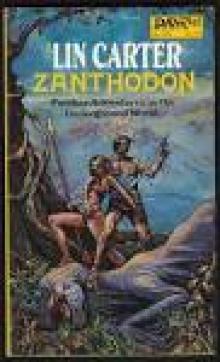 Zanthodon
Zanthodon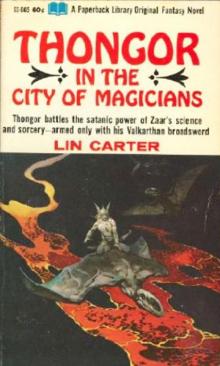 Thongor in the City of Magicians
Thongor in the City of Magicians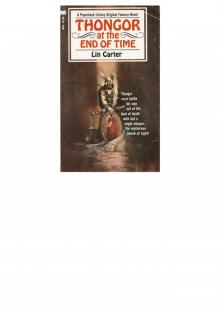 Thongor at the End of Time
Thongor at the End of Time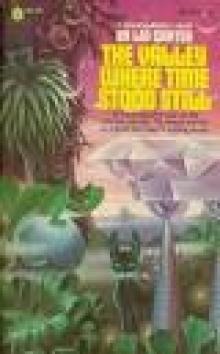 The Valley Where Time Stood Still
The Valley Where Time Stood Still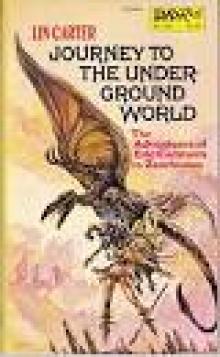 Journey To The Underground World
Journey To The Underground World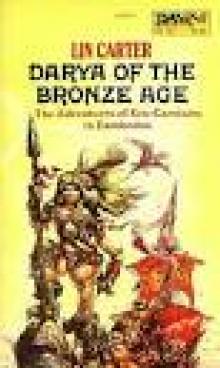 Darya of The Bronze Age
Darya of The Bronze Age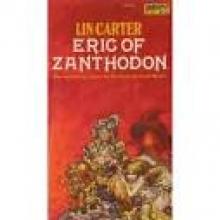 Eric of Zanthodon
Eric of Zanthodon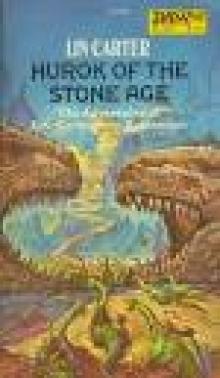 Hurok Of The Stone Age
Hurok Of The Stone Age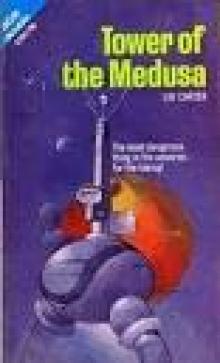 Tower Of The Medusa
Tower Of The Medusa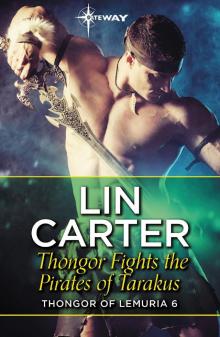 Thongor Fights the Pirates of Tarakus
Thongor Fights the Pirates of Tarakus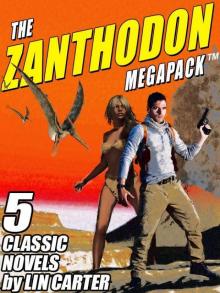 The Zanthodon MEGAPACK ™: The Complete 5-Book Series
The Zanthodon MEGAPACK ™: The Complete 5-Book Series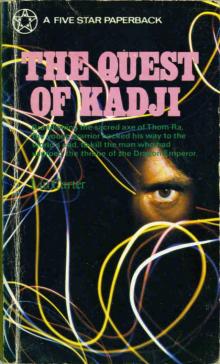 The Quest of Kadji
The Quest of Kadji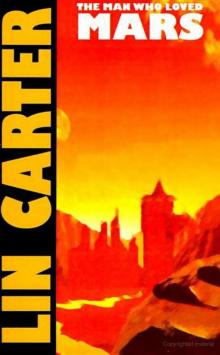 Lin Carter - The Man Who Loved Mars
Lin Carter - The Man Who Loved Mars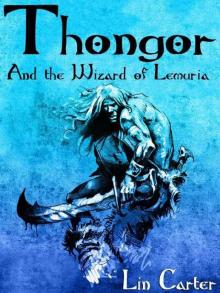 Thongor and the Wizard of Lemuria
Thongor and the Wizard of Lemuria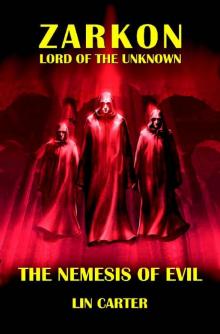 The Nemesis of Evil
The Nemesis of Evil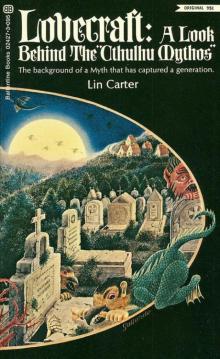 H.P.Lovecraft: A Look Behind Cthulhu Mythos
H.P.Lovecraft: A Look Behind Cthulhu Mythos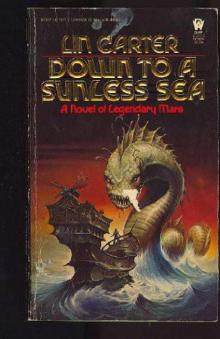 Lin Carter - Down to a Sunless Sea
Lin Carter - Down to a Sunless Sea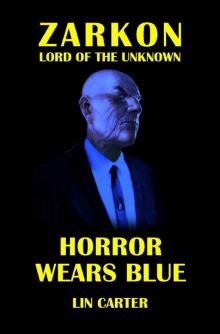 Horror Wears Blue
Horror Wears Blue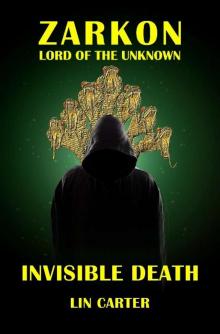 Invisible Death
Invisible Death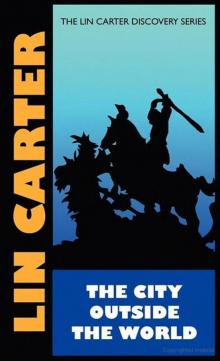 Lin Carter - The City Outside the World
Lin Carter - The City Outside the World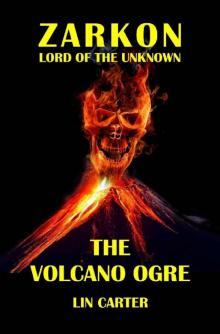 The Volcano Ogre
The Volcano Ogre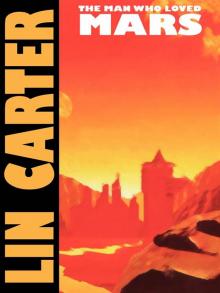 The Man Who Loved Mars
The Man Who Loved Mars